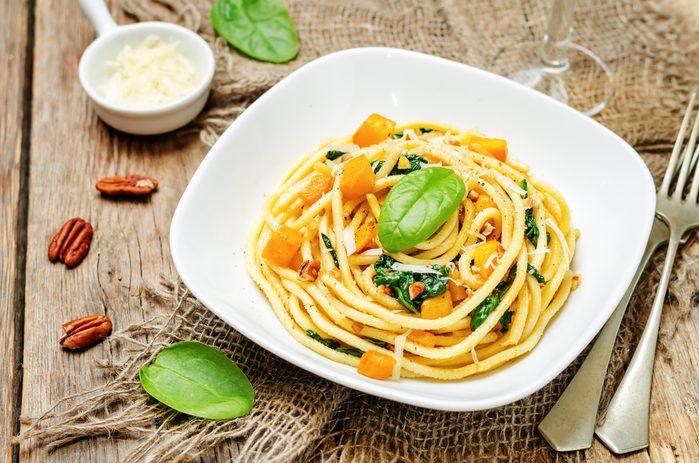
Do You Gain Weight In Winter?
Do you notice the number on the scale creep up during the grey in months between the holidays and spring? You’re not alone. Many of us bemoan dreaded winter weight gain around this time of year. But contrary to popular belief, there’s no scientific evidence to prove that we’re biologically predisposed to weight gain in the colder months. Unless you’re a bear, that is. “We do know that in [hibernating] animals there will be seasonal changes in hunger hormones, but there really is nothing to suggest that that’s true in people,” says Dr. Yoni Freedhoff, medical director of the Bariatric Institute in Ottawa.
That said, our behaviour in colder months may lead to winter weight gain for some of us. Here are three reasons why you’re more likely to gain weight in the winter and how you can break the habit.

We Over Eat During The Holidays
Remember all those heavy meals and finger foods you consumed during the holiday season? The evidence may be sticking around long after the celebrating has stopped. Research shows that we tend to gain one or two pounds between late November and early January, says Freedhoff. That may be a lot less than you thought you’d gained eating Grandma’s stuffing, but studies also suggest that we often don’t lose that weight year after year. “It may be that when spring comes around, you see a few more pounds on the scale than you saw the year before,”Freedhoff explains.

We Feel Down During The Winter Months
Seasonal affective disorder (SAD), a type of depression that typically affects people over the winter, may cause sufferers to eat more when it’s cold and dark. “We know that food itself is a comfort as far as mood goes, because it actually impacts the same circuitry of the brain as drugs do. So people use food medicinally to make themselves feel better,” Freedhoff says. Those who struggle with their mood in the winter may find themselves consuming more high-calorie comfort foods at this time of year.

We’re Less Active In The Winter
This certainly isn’t true for everybody. Winter sports enthusiasts may actually become more active during this season. But if you’d rather curl up under a blanket than hit the slopes when the temperature drops, you may be more sedentary during the winter months. While Freedhoff points out that exercise doesn’t burn as many calories as you may think (running an entire marathon only burns about a pound), studies show that people who are more active tend to eat less.
If you are prone to winter weight gain, fear not ‘ consciously changing your behaviour during this time of year can help ward off those extra pounds.

How To Avoid Winter Weight Gain: Cook Meals From Scratch
The simplest way to control your weight is to eat more home-cooked meals made from whole ingredients, Freedhoff says. ‘There is probably nothing more straightforward than markedly reducing meals out, packing lunches every single day and avoiding the processed food aisle,’ he says, adding that meals made with whole ingredients such as lean meats, fruits and vegetables will almost certainly have lower calorie counts than processed and pre-made foods.

How To Avoid Winter Weight Gain: Seek Help For Depression
If you think your overeating is a symptom of seasonal affective disorder, you may need professional help, Freedhoff advises. Talk to your doctor about treatments such as using a light box to lift your mood, or seeing a therapist. You may also want to discuss medical options to help you through a low period. Managing your mood disorder may help get your emotional eating under control.

How To Avoid Winter Weight Gain: Modify Recipes
When the snow flies, most of us are more likely to crave stick-to-you-ribs comfort food than lighter fare. There’s no need to deprive yourself of the foods you love, just look for ways to modify your favourite recipes to make them healthier.

How To Avoid Winter Weight Gain: Cook as a Family
Staying in on a snowy day? Take the opportunity to give your family a healthy cooking lesson. “There’s no skill more valuable to your kids’ health than teaching them to cook healthy, nutritious meals from scratch ingredients,”Freedhoff says. Having your kids help with meal preparation is one way to start them participating in the kitchen.
